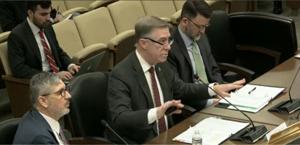(The Center Square) — Automakers in California and many other states may soon have to restrict sales of gasoline and non-plug-in hybrid vehicles this year if California’s zero-emission vehicle requirement is not overturned, industry leaders say.
California’s Advanced Clean Cars II rule, which phases out the sale of gas-powered cars in 2035, requires that 35% of model year 2026 vehicles be either zero emission — which largely means battery-electric, though hydrogen vehicles exist — or plug-in-hybrids that have both gas engines and battery-powered electric motors.
The ACC II mandate applies to Massachusetts, New York, Oregon, Vermont, and Washington for model year 2026, and Colorado, Delaware, Maryland, New Jersey, New Mexico, Rhode Island, and Washington, D.C. for model year 2027.
The California New Car Dealers Association’s report on car sales in the year’s first quarter earlier comments by Toyota that the mandate is “impossible” to meet: ZEV market share fell from 22% in 2024, to 20.8% in the first quarter of 2025.
“If CARB doesn’t pause or adjust the ACCII mandate, we are concerned automakers will restrict shipments of traditional hybrids and affordable gas-powered models to avoid massive fines,” said CNCDA President Brian Maas to The Center Square. “This is occurring in California’s heavy-duty truck marketplace, which has been devastated by similar CARB rules that took effect in January 2024.”
In California, which has the nation’s highest gas prices and second-highest energy prices, and where the state asks EV owners to refrain from charging on hot days to limit grid stress, residents have been flocking to standard hybrid vehicles. Standard hybrid market share 37% in the past year, from 13.1% in the first quarter of 2024 to 17.9% of the market in the first quarter of 2025.
However, standard hybrids don’t count toward the state mandate, so with the 2026 model year vehicles starting to hit showrooms this spring, combined EV and plug-in hybrid sales would need to increase 68% more or less overnight to meet the state’s mandate.
Automakers only earn credits toward their mandate by selling qualifying vehicles, or buying credits from automakers with excess credits, like Tesla. But if EV sales continue to falter and there aren’t enough credits, automakers may have to pay the state $20,000 per vehicle sold for each credit they are short — or start restricting the sale of the regular gas cars and in-demand standard hybrids.
This means automakers may be forced to only offer pricier plug-in-hybrid and all-electric models, which Maas says will push more California buyers into other states, or to the used market, which would push prices for used cars even higher.
“We expect these inventory shortages of traditional hybrid and gas-powered models to become more acute over time,” continued Mass. “We are also concerned that shortages of new vehicles will increase used vehicle prices and will push Californians to purchase new vehicles from neighboring states.”
This wouldn’t be the first time automakers have restricted sales in California to meet its emissions requirements.
In 2023, Stellantis, which owns Jeep, made gasoline-powered non-hybrids available only as special order vehicles in California and other states that have adopted California Air Resources Board Standards. However, Jeep continued to maintain inventory of plug-in hybrids.
The plug-in hybrid Jeep Wrangler starts at $50,695, while the regular gas-powered Jeep starts at $31,995.
The Biden administration approved the ACC II “gas car ban” in December. Because California’s air regulations pre-date the EPA, the state is allowed to pass its own air regulations more stringent than the national standard, so long as the EPA grants a waiver for each rule.
Congressional Republicans are seeking to overturn the EPA’s granting of the waiver by claiming the power of congressional review, which allows Congress to overturn regulatory actions by executive agencies with a majority vote.
While the Senate parliamentarian quashed one effort, motions to overturn the waivers in the House could make their way back up to the Senate and to the president’s desk.





















































